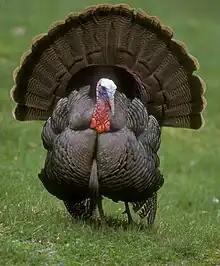Wild turkey
The wild turkey (Meleagris gallopavo) is the name of the more common of the two species of turkey. This large bird is found across much of the United States and southern Canada.[2][3][4]
| Wild turkey | |
|---|---|
 | |
| Male (Tom) wild turkey displaying | |
| Scientific classification | |
| Domain: | Eukaryota |
| Kingdom: | Animalia |
| Phylum: | Chordata |
| Class: | Aves |
| Order: | Galliformes |
| Family: | Phasianidae |
| Genus: | Meleagris |
| Species: | M. gallopavo |
| Binomial name | |
| Meleagris gallopavo | |
Wild turkeys prefer hardwood and mixed conifer-hardwood forests with scattered openings such as pastures, fields, orchards and seasonal marshes. They can adapt to any dense plant community so long as there is cover and openings to fly out. Open, mature forests with a variety of tree species seem to be best.
The domesticated turkey has been tamed and bred from wild turkeys, by people, to raise on farms.
References
- BirdLife International (2018). "Meleagris gallopavo". IUCN Red List of Threatened Species. 2018: e.T22679525A132051953. doi:10.2305/IUCN.UK.2018-2.RLTS.T22679525A132051953.en. Retrieved 19 November 2021.
- Webster's II New College Dictionary. Houghton Mifflin Harcourt 2005, ISBN 978-0-618-39601-6, p. 1217
- Andrew F. Smith (2006). The turkey: an American story. University of Illinois Press 2006, ISBN 978-0-252-03163-2, p. 17.
- Dickson, 362; "Why a turkey is called a turkey". Npr.org. Retrieved on 2012-12-19.
This article is issued from Wikipedia. The text is licensed under Creative Commons - Attribution - Sharealike. Additional terms may apply for the media files.
